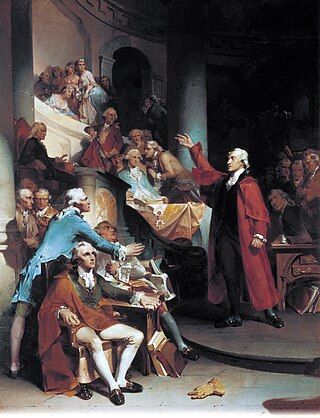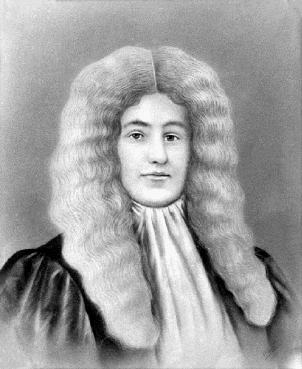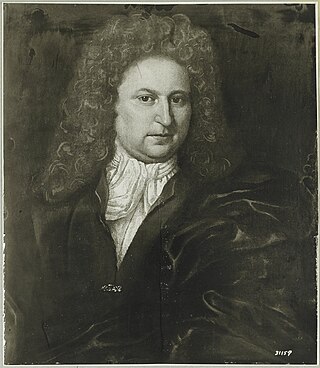
Patrick Henry was an American politician, planter and orator who declared to the Second Virginia Convention (1775): "Give me liberty, or give me death!" A Founding Father, he served as the first and sixth post-colonial Governor of Virginia, from 1776 to 1779 and from 1784 to 1786.

The House of Burgesses was the elected representative element of the Virginia General Assembly, the legislative body of the Colony of Virginia.

William Randolph I was an English-born planter, merchant and politician in colonial Virginia who played an important role in the development of the colony. Born in Moreton Morrell, Warwickshire, Randolph moved to the colony of Virginia sometime between 1669 and 1673, and married Mary Isham a few years later. His descendants include many prominent individuals including Thomas Jefferson, John Marshall, Paschal Beverly Randolph, Robert E. Lee, Peyton Randolph, Edmund Randolph, John Randolph of Roanoke, George W. Randolph, and Edmund Ruffin. Due to his and Mary's many progeny and marital alliances, they have been referred to as "the Adam and Eve of Virginia".
John Holloway was a politician and lawyer in the British colony of Virginia. He served as Speaker of the House of Burgesses (1720–34), having represented at various times, King and Queen County, York County and Williamsburg. He also served as the first mayor of Williamsburg, Virginia (1722–23), and treasurer of the colony (1723–34).

John Robinson, Jr. was an American politician and landowner in the colony of Virginia. Robinson served as Speaker of the House of Burgesses from 1738 until his death, the longest tenure in the history of that office.
Thomas Stegg was a British merchant and politician in the Colony of Virginia. He served in both houses of the Virginia General Assembly, and became the first elected Speaker of the Virginia House of Burgesses during the 1643 session, when the Burgesses first met as a separate lower house.
Ambrose Harmer was a Virginia landowner and politician. An opponent of Governor Sir John Harvey, he served on the Council 1639–41 under his successor, Sir Francis Wyatt. He served in the House of Burgesses 1645–46, and was Speaker in the 1646 session.
Captain Thomas Harwood emigrated from Britain and became a soldier, landowner and politician in the Colony of Virginia. He founded a family which like him for generations often represented the area now known as Newport News, but which in his day was known as Mulberry Island, and later Warwick River and still later Warwick County. Despite coming into conflict with royal governor Sir John Harvey in 1635, and a gap in legislative service, Harwood became the 5th speaker of the House of Burgesses.
Thomas Dew was a Virginia landowner and politician representing Nansemond County.
Walter Chiles was a British merchant who emigrated to the Colony of Virginia where in addition to his business interests, he became a prominent planter, military officer and politician who at times represented Charles City County and James City County in the House of Burgesses, as well as briefly served on the Virginia Governor's Council and as Speaker of the House of Burgesses until removed by Governor WIlliam Berkeley because of a conflict of interest in ongoing litigation.
William Whitby emigrated from England to the Virginia colony where he became politician and major landowner. He represented Warwick County as a burgess several times, and became Speaker of the Virginia House of Burgesses in the 1653 session.
Francis Moryson was an English soldier who became a Virginia colonial official and agent. A Royalist in the English Civil War, he emigrated to the Virginia Colony, where he held several posts before returning to England and becoming the colony's agent, and finally briefly served on the commission investigating Bacon's Rebellion.
Henry Soane (1622–1661) was a Virginia politician, real estate investor and landowner who served in the House of Burgesses 1652–55, 1658, and 1660–61, and was its Speaker in 1661.
Robert Wynne (1622–1675) was a Virginia politician and landowner. He was one of the men representing Charles City County in the House of Burgesses from 1658 until 1675, and in 1658 and during the Colony's "Long Parliament" fellow burgesses selected him as their Speaker 1662–74. This was the second longest tenure of any Speaker.

Colonel Augustine Warner Jr. was an American planter, military officer and politician. He served in the House of Burgesses from 1666 to 1677 and was its Speaker in two separate sessions in 1676 and 1677, before and after Bacon's Rebellion. Warner then served on the Virginia Governor's Council from October 1677 until his death. Warner is the last common ancestor of George Washington and King Charles III.
Thomas Godwin was a Virginia politician, planter and real estate speculator in Tidewater Virginia. He thrice served in the House of Burgesses representing the Nansemond River area, and was its Speaker in the June 1676 session that preceded Bacon's Rebellion.
Francis Dade, was a Virginia soldier, politician and landowner. An English Royalist who emigrated to Virginia some time after the death of Charles I. In Virginia he officially used the name "John Smith" when he served as one of the two delegates representing tiny Warwick County and as Speaker of the Virginia House of Burgesses in 1658. He died at sea in 1662 or 1663.

Peter Beverley was an English-born planter and lawyer who served as the 27th speaker of the House of Burgesses as well as treasurer of the Colony of Virginia (1710-1723). His father Robert Beverley had been the clerk of the House and a prominent member of the "Green Spring" faction in the decade after Bacon's Rebellion, and Peter Beverley also served as clerk before winning election as a Burgess and serving as speaker in four of the five assemblies at the beginning of the 18th century.
Col. William Travers was a lawyer, early settler and politician of Colonial Virginia.






